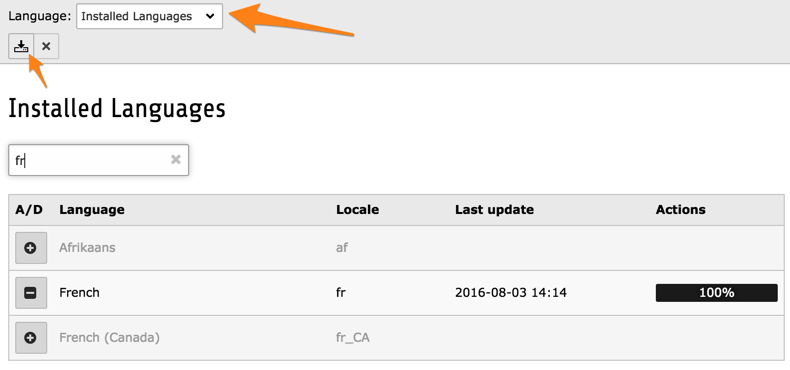Attention
TYPO3 v8 has reached its end-of-life March 31st, 2020 and is not maintained by the community anymore. Looking for a stable version? Use the version switch on the top left.
There is no further ELTS support. It is recommended that you upgrade your project and use a supported version of TYPO3.
Internationalization and localization¶
Except for some lowlevel functions, TYPO3 CMS exclusively uses localizable strings for all labels displayed in the backend. This means that the whole user interface may be translated. The encoding is strictly UTF-8.
The default language is English, and the Core ships only with such labels (and so should extensions).
All labels are stored in XLIFF format, generally located in the
Resources/Private/Language folder of an extension (old locations
may still be found in some places). Working with XLIFF files is
described in more detail in Core API.
Adding a language to TYPO3 CMS¶
The list of supported languages is defined in
\TYPO3\CMS\Core\Localization\Locales::$languages.
Adding support for a new language thus starts by adding
the language there and waiting for the next release.
Translating TYPO3 CMS¶
Translations happen on the community translation server (https://translation.typo3.org/) both for the Core and for extensions. More information can be found in the Frontend Localization Guide.
Fetching translations¶
The ADMIN TOOL > Languages module shows a list of available languages. In the "Installed Languages" view, you can choose which languages you would like to make available to your users.

The Languages module, with an active search and showing status of languages¶
By using the "Download all" icon in the docheader the
update of translations for all extensions in all selected languages is triggered.
The downloaded language packs are stored in typo3conf/l10n/[language code].
The "Translation Overview" view of the Languages module offers a fine-grained interface, where a single language pack can be downloaded.
All languages packs can also be fetched using the command line:
/path/to/typo3/bin/typo3 extbase language:update
The language classes¶
Various classes are involved in the localization process.
The \TYPO3\CMS\Core\Localization\LocalizationFactory class is dedicated
to loading the language files. It also manages
localization overrides.
The \TYPO3\CMS\Lang\LanguageService provides the actual methods
to retrieve a localized label. getLL() gets a label from an already
loaded language file. sL() loads a language file first and then
returns a label from it (using a string with the LLL:EXT:... syntax as argument).
The \TYPO3\CMS\Extbase\Utility\LocalizationUtility is essentially
a convenience wrapper around the \TYPO3\CMS\Lang\LanguageService class,
whose translate() method also takes an array as argument and runs
PHP's vsprintf() on the localized string.
